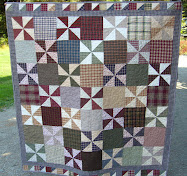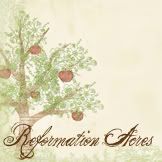
I would first always advise eating as much fresh picked foods as possible over eating canned foods. But, the reality is that even if our family ate green beans from our garden every single night with dinner, we would still end up with a bunch left over as our garden abounds! Canning foods is a great way to preserve the bounty from your garden. Let me share an excerpt from the "Complete Guide to Home Canning" regarding the benefits of canning:
"Canning can be a safe and economical way to preserve quality food at home. Disregarding the value of your labor, canning homegrown food may save you half the cost of buying commercially canned food. Canning favorite and special products to be enjoyed by family and friends is a fulfilling experience and a source of pride for many people.
Many vegetables begin losing some of their vitamins when harvested. Nearly half the vitamins may be lost within a few days unless the fresh produce is cooled or preserved. Within 1 to 2 weeks, even refrigerated produce loses half or more of some of its vitamins. The heating process during canning destroys from one-third to one-half of vitamins A and C, thiamine, and riboflavin. Once canned, additional losses of these sensitive vitamins are from 5 to 20 percent each year. The amounts of other vitamins, however, are only slightly lower in canned compared with fresh food. If vegetables are handled properly and canned promptly after harvest, they can be more nutritious than fresh produce sold in local stores.
The advantages of home canning are lost when you start with poor quality fresh foods; when jars fail to seal properly; when food spoils; and when flavors, texture, color and nutrients deteriorate using prolonged storage."
Many vegetables begin losing some of their vitamins when harvested. Nearly half the vitamins may be lost within a few days unless the fresh produce is cooled or preserved. Within 1 to 2 weeks, even refrigerated produce loses half or more of some of its vitamins. The heating process during canning destroys from one-third to one-half of vitamins A and C, thiamine, and riboflavin. Once canned, additional losses of these sensitive vitamins are from 5 to 20 percent each year. The amounts of other vitamins, however, are only slightly lower in canned compared with fresh food. If vegetables are handled properly and canned promptly after harvest, they can be more nutritious than fresh produce sold in local stores.
The advantages of home canning are lost when you start with poor quality fresh foods; when jars fail to seal properly; when food spoils; and when flavors, texture, color and nutrients deteriorate using prolonged storage."
Not to mention that you actually know what is going into your canned foods. Most store bought canned goods contain extra sugars, salts and other preservatives. If you read the labels, you may be grossly surprised.
I am super excited to be sharing canning this month! We are going to be covering the supplies that you need, how to can, the difference in hot water bath canning and pressure canning, lots of yummy recipes for canned foods and much more. I hope you'll enjoy it!

.jpg)


















































8 comments:
Heather,
The information on the vitamins is something I've wondered about quite a bit. Any chance freezing them would keep the few vitamins that are lost? One thing I can with confidence are tomatoes since the lycopene increases when canned.
Thanks for such great research!
Amy, I found this on wikipedia:
"Vitamin Content of Frozen Foods
-Vitamin C: Usually lost in a higher concentration than any other vitamin. A study was performed on peas to determine the cause of Vitamin C loss. A vitamin loss of ten percent occurred during the blanching phase with the rest of the loss occurring during the cooling and washing stages. The vitamin loss was not actually accredited to the freezing process. Another experiment was performed involving peas and lima beans. Frozen and canned vegetables were both used in the experiment. The frozen vegetable were stored at -10 °F and the canned vegetables were stored at room temperature (75 °F). After 0, 3, 6, and 12 months of storage, the vegetables were analyzed with and without cooking. O'Hara, the scientist performing the experiment said, "From the view point of the vitamin content of the two vegetables when they were ready for the plate of the consumer, there did not appear to be any marked advantages attributable to method of preservation, frozen storage, processed in a tin, or processed in glass."
-Vitamin B1 (Thiamin): A vitamin loss of 25 percent is normal. Thiamin is easily soluble in water and is destroyed by heat.
-Vitamin B2 (Riboflavin): Not much research has been done to see how much freezing affects Riboflavin levels. One study found an 18 percent vitamin loss in green vegetables while another found a 4 percent loss. It is commonly accepted that the loss of Riboflavin has to do with the preparation for freezing rather than the actual freezing process itself.
-Vitamin A (Carotene): There is little loss of Carotene during preparation for freezing and freezing of most vegetables. However, there is a danger of losing the vitamin during a long-continued storage period."
Hope that's a little helpful! I would think than frezing foods would hold more nutrients than canning- I guess it just depends on how big of a freezer you have! :)
We utilize our freezer in the house and an upright in the garage for mostly meats, milk and butter. We do also have frozen fruits in them. I personally wouldn't be able to store, frozen, all the veggies we can.
I freeze what I can, and what I can't freeze, I can! And this year I am trying some veggie fermentation, so I have a whole other option!
Thank you for doing this series! I tried my hand at canning this past weekend, with corn relish and pickled cukes. I've got my fingers crossed that I did it right! I'll be reading avidly!
I'm looking forward to this month of canning info! I've done a little bit of canning but not a whole lot. Mainly jams. I've helped can tuna before also.
We are heading out on Thursday to my brother and sis in laws house. They have a ton of fruit trees that are ripe and ready for picking. So I'm taking boxes, buckets and ice chests. We will probably end up with apricots, peaches, plums and blackberries. I can't remember what other fruit trees they have but if it's ripe, I'm picking it!
I am really excited to hear about canning. SInce I've started gardening, I've been thinking of trying it. Looking forward to what you have to say:) Thanks Heather!!!
I'm looking forward to the posts on canning. One of my friend sloves to can and she'll be teaching some basic home canning at her church. One of these days I'll actually try canning!!! Have a great week. Love and hugs from Oregon, Heather :)
Thank you for stopping by my blog today. I commented on your comment. If you have time, can you stop by again and read the comment on hot packing? I would like my readers to see the answer as well.
I really enjoy reading your blog. Keep up the wonderful posts.
Blessings,
Christa
Post a Comment